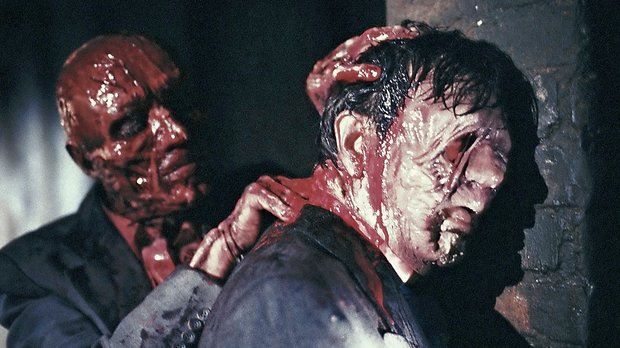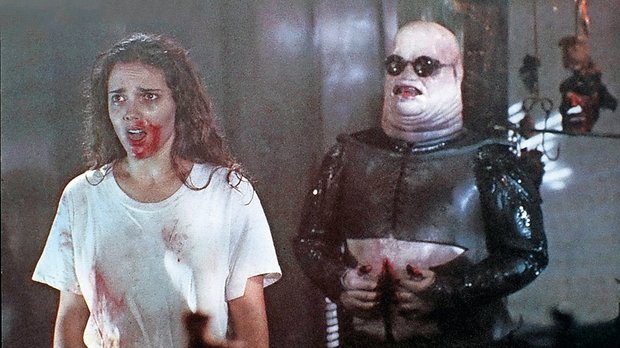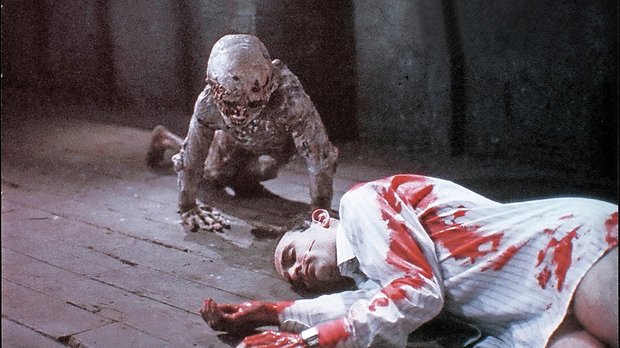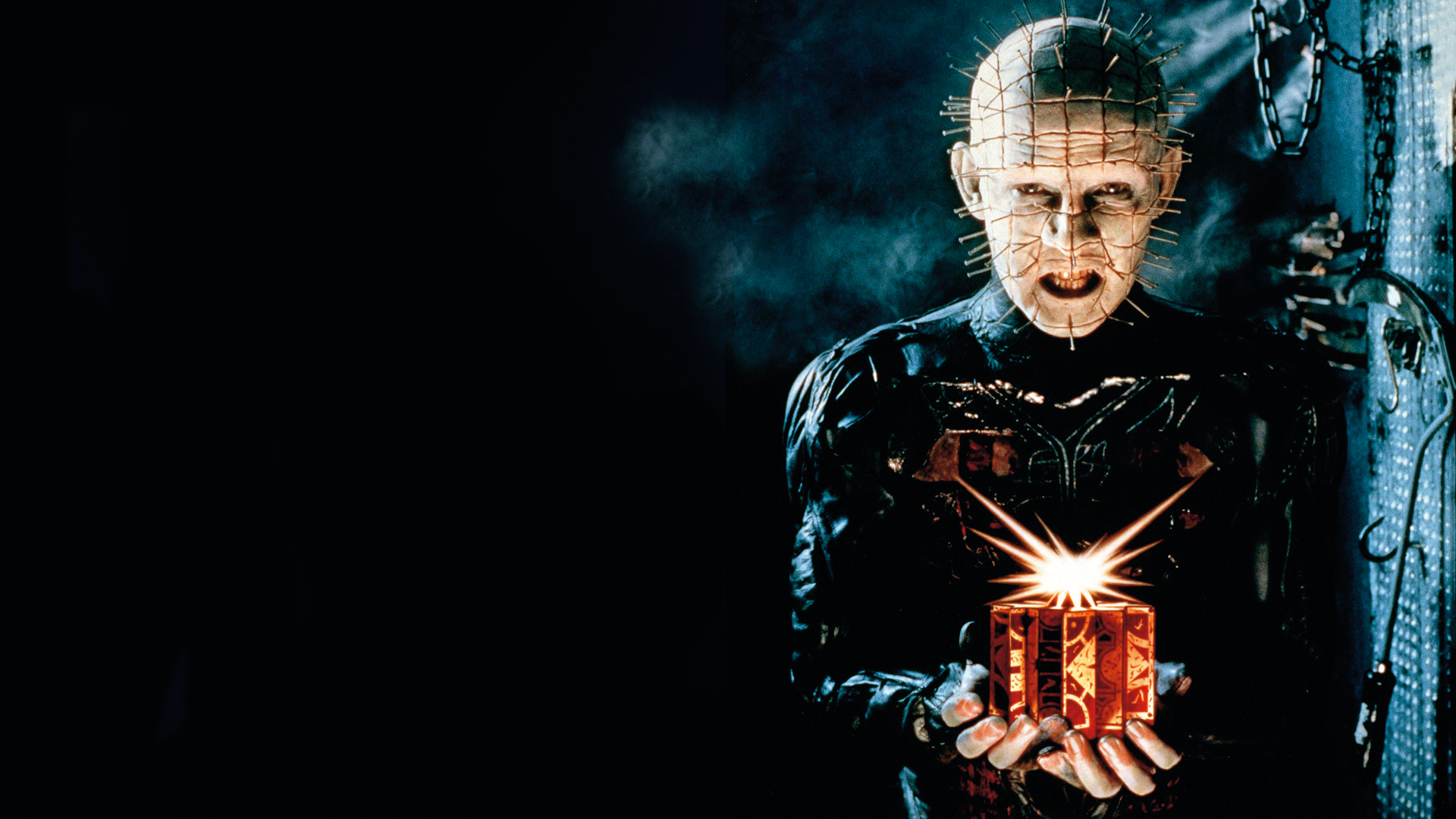If you frequented fear films back in the ’80s chances are you could not help but bemoan the sorry state of British horror. Once the country which spawned Amicus and Hammer – as well as shocking cinemagoers with such macabre masterworks as The Wicker Man and Witchfinder General – the UK had all but ceased expanding on its proud portfolio of scary movies by the time the ’80s rolled around. Moreover, when national nastiness did rear its ugly head it was with such ridiculous fare as Dream Demon (1988) and, oddly enough, the Clive Barker-penned monster-mash Rawhead Rex (1986).
It was the latter fiasco which finally encouraged rising star novelist Barker – who hated the final film – to put down his pen and take up the director’s chair himself. In doing so, the author showed a new generation of gore-hounds that our fine island could still chalk up a crimson-caked classic from time to time. “I’d worked with Clive on some of his short films, so I wasn’t surprised when he asked me to be in Hellraiser,” states Doug Bradley, the man who became an instant genre icon thanks to his role as Pinhead, leader of a rogue band of Satanic servants called the Cenobites.

“I had absolute faith in Clive’s vision and judgement and I also knew that, with his visual eye at the helm, Hellraiser was going to be an interesting movie. I think we were doing something that was going slightly against the grain of what else was happening in the horror world at the time – this was not Friday The 13th Part 19 or whatever. But when you are making a film you tend to just keep your head down and get on with it so I never really grasped what a big deal Hellraiser was going to be. Often you don’t know what you’ve got until it’s done. I do remember seeing the finished film and thinking, ‘Yeah, this is really interesting and scary.’ However, I was so close to it that I did not see the wood for the trees. I certainly did not expect to be sitting here 25 years down the line talking about it.”
Based on Barker’s novella The Hellbound Heart, Hellraiser introduces the viewer to American expat Larry (played by Dirty Harry villain and Star Trek: Deep Space Nine thespian Andy Robinson), his recently-wedded British wife Julia (Clare Higgins) and teenage daughter Kirsty (Ashley Laurence). As the three move into their new house in London, Julia encounters her husband’s sadomasochistic brother Frank hiding in the attic – a man with whom she once had a passionate, pre-marriage affair. However, in this case, he is not quite the same person he used to be. Having stumbled across a puzzle box called The Lament Configuration, whose secrets unlock the gates of Hell amid promises of perverse pleasures, Frank managed to raise a tribe of demons, the Cenobites, and was promptly skinned alive in the great “down under”. Managing to flee from Hell, the blood-caked brother-in-law asks Julia to murder for him – with fresh human meat replenishing his flesh. However, after the two kill her father, Kirsty manages to summon the Cenobites herself and, ultimately, makes a deal with the devil to deliver their rogue escapee straight back to Hades...

“Hellraiser was a huge success when it came out and critics were saying that British horror might be making a comeback,” continues Bradley. “However, the sad truth is that Clive could not get any money from the UK and actually had to finance it in America [laughs]. I also recall that Pinhead was everywhere – we even made it onto the front of Time Out when the film premiered. But, strangely enough, Pinhead was only on the cinema poster and the video box by default. It was originally supposed to be skinless Frank on there but that got vetoed by the distributors because it was deemed to be too gruesome.”
For aspiring actor Bradley, however, this newfound fame was both a blessing and a curse. “Every piece of publicity I saw about Hellraiser, in print or on TV, featured Pinhead but my name was never attached to it,” states the performer. “That was the oddest thing. It was great to be so heavily featured but there was no way to prove to anyone that it was actually me [laughs]. I didn’t do a single interview when Hellraiser came out. I don’t know if that was a deliberate decision, so as to keep Pinhead mysterious. I know a lot of fans, particularly in America, told me that Andy Robinson, Clare Higgins and Ashley Lawrence were on MTV and the morning chat shows and everything – but whenever they showed a clip from the film it was always of Pinhead. So those who were following Hellraiser at the time were wondering where the guy with the pins was! Well I can tell you where I was – I was sitting at home in England, watching it all happen from the sidelines [laughs].”
Nevertheless, thanks to the aura of Pinhead, Hellraiser became as synonymous with its leading Cenobite as A Nightmare On Elm Street was with Freddy Krueger. Consequently, when the decision was made to turn Barker’s brainchild into a franchise, the thought of doing this without Bradley was, frankly, unthinkable. As such, the actor would headline seven further Hellraiser instalments, although none of them would match the skill, or provide the chills, of the original.
Get sneak previews, exclusive competitions and details of special events each month!
“I would always point back to the first film as my favourite of the series,” admits Bradley. “That’s for a whole lot of reasons – mainly because it was my first feature film and it was a very vivid experience: not only learning the ins and outs of how a movie set worked but also dealing with latex, fake nails sticking out my head, black contact lenses and wearing a leather skirt [laughs]. I enjoyed the character in that first film too – you knew he was from Hell, and that there was a very perverse element to him, but Pinhead was still quite a mysterious presence in the original Hellraiser.”

Alas, as Hellraiser morphed into the hurried Hellbound: Hellraiser II (1988), and the hokey Hellraiser III: Hell On Earth (1992), quality took a notable nosedive – and, to add insult to injury, the distinct British setting was nonsensically swapped for New York. Nevertheless, Barker remained on board as a producer up until the Pinhead-in-outer-space silliness of fourth flick Hellraiser: Bloodline (1996), at which point it was clear that the template of his terrifying original opus had long been lost to head-squashing splatter gags and semi-naked scream queens. Come 2000’s fifth outing, Hellraiser: Inferno, the series cemented itself as a cheaply-made direct-to-DVD staple – complete with a constantly cackling villain whose cheese-factor rivalled that of Jar Jar Binks.
Naturally, this was a far cry from the high-octane horror of Barker’s mind-bending first movie... “I think it’s inevitable, with any film franchise, that the law of diminishing returns begins to apply,” sighs Bradley of the Hellraiser mythology. “My main misgivings are that, from Hellraiser: Bloodline onwards there were massive problems. I think these were problems which were avoidable and mainly down to the production company, Dimension Pictures. For example, they decided that Bloodline was too long and they began cutting it, changing the ending, which undermined the film, and then our director quit. The next three films were moved to DVD only, which I don’t think is a big deal necessarily, but it’s nice to have someone backing you and supporting you. So at that point it felt as if Dimension, who had since had a lot of success with the Scream films, were not so interested in Hellraiser any more.”

However, few Hellraiser fans will be aware of the fact that Pinhead did have a brief shot at respectful reanimation thanks to the success of 2003’s franchise-filleting Freddy Vs Jason... “When Freddy Vs Jason came out and stomped all over the box office, Dimension decided that they wanted a Hellraiser Vs Halloween movie made yesterday,” chuckles Bradley. “I was actually getting excited by the prospect of this because Clive said he would write it and John Carpenter said he would direct it. I actually spoke to Clive about it a couple of times and he was interested in finding the places where the Halloween and Hellraiser worlds intermeshed. For instance, I remember him speaking about how, in the first Halloween, Loomis is running around and telling everybody that Michael Myers is some source of pure evil – as if he is from Hell itself. But the late Moustapha Akkad, who owned the Halloween series, retained enough control to have the final word and when he caught wind of this he said no.”
As a result, Bradley’s Pinhead would bow out of horrordom with 2005’s Hellraiser: Hellworld – in which a group of teenagers are fed mind-altering drugs by Lance Henriksen and subsequently begin to imagine that the Cenobites are coming to kill them. In other words: it was hellishly awful.
Hardly surprising, then, that when Dimension opted to make its latest franchise entry with 2011’s Hellraiser: Revelations, Bradley had decided enough was enough. “Revelations was only made so that Dimension could keep the rights to Hellraiser,” says Bradley. “They didn’t have a lot of time to organise it, or do it properly, so I said no. However, I wished them good luck and I have no ill-will towards the guy who stepped into Pinhead’s role. Now, of course, all we can do is wait and see what will happen with the remake that they keep speaking about...”
Not to worry, though, because for anyone who values the sexually-subversive universe of Clive Barker, one thing is for sure: there is only one Pinhead and only one Hellraiser that is truly worth your time. And for that, you need to turn to 1987’s original venture: a classic terror title that would likely send shivers down the spine of Satan himself. It can hold its head high as a true Brit-classic of cinematic creepiness – the key film which pulled UK horror out of the doldrums and into the delirium of the modern day. Jesus wept.
Click here for more excellent SFX articles. Or maybe you want to take advantage of some great offers on magazine subscriptions? You can find them here.
SFX Magazine is the world's number one sci-fi, fantasy, and horror magazine published by Future PLC. Established in 1995, SFX Magazine prides itself on writing for its fans, welcoming geeks, collectors, and aficionados into its readership for over 25 years. Covering films, TV shows, books, comics, games, merch, and more, SFX Magazine is published every month. If you love it, chances are we do too and you'll find it in SFX.


